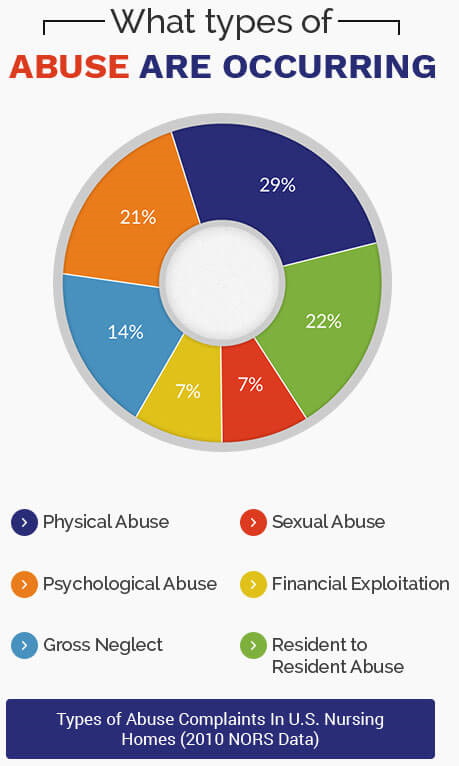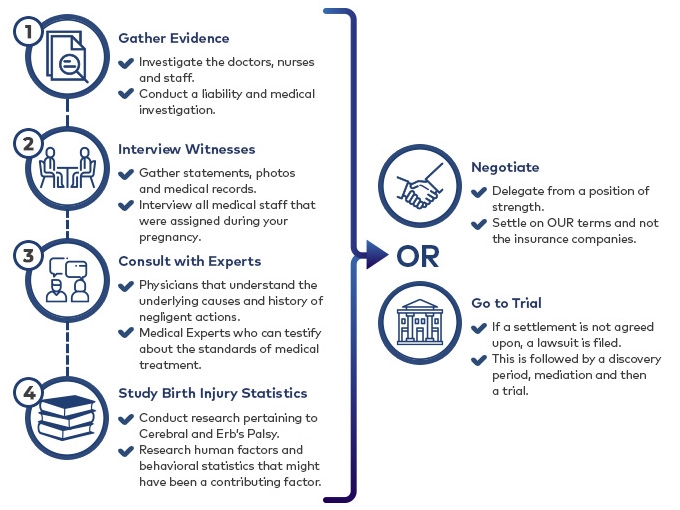
Types of Nursing Home Abuse & Neglect
- Emotional Abuse & Neglect
Humiliation, ridicule, or threats are all forms of psychological abuse. This may manifest as isolation or an open disregard of the victim of such abuse. - Sexual Abuse
Any nonconsensual sexual act, such as molestation of a patient is sexual abuse. - Physical Abuse
Usually the most obvious form of abuse, this involves any violence against the victim. This includes scratching, biting, hitting, punching, etc. Additionally, this includes unnecessary restraint. - Personal Hygiene & Basic Needs Neglect
It is a form of elder abuse when a patient is not granted the needed assistance to bathe or groom, or if they are not provided with a safe and clean living area. - Medical Abuse & Neglect
Failure to give proper medication and failure to notice forming issues are a couple of the common ways this may manifest. Signs of medical abuse & neglect may include malnourishment or dehydration.
Nursing Home Abuse & Negligence Lawyers
Long Island Personal Injury Lawyers Skilled in Assisting Residents of Assisted-Living Facilities
Nursing homes are thoroughly regulated by New York laws. These rules help provide a standard of care to which every facility and its employees must adhere. However, it is not uncommon for wrongful or careless actions to occur there, and some of these events can cause serious harm or even a tragic death. The nursing home negligence attorneys at Duffy & Duffy are experienced in representing injured individuals in Long Island and the surrounding regions. Our legal team serves residents of the New York metropolitan area, including Queens and the Bronx as well as Suffolk, Nassau, and Kings Counties.
Pressing a Nursing Home Abuse Lawsuit Against a Negligent Nursing Home
In most cases based on harm or physical abuse that occurs in a nursing home, a claimant will try to show that the facility and its employees acted negligently. This means establishing that they had a duty of care but breached that obligation with some specific action. It is also necessary to show that injuries were directly caused by the inadequate care and that the resident suffered actual damages because of them. Since nursing homes are a regulated industry, the appropriate standard of care is often directly set forth in New York regulations. This may assist victims in showing that a certain type of conduct, such as failing to properly monitor a resident for bed sores, fell short of what would be expected in the circumstances. Compensation may be available if the injured person can prove that he or she would not have been hurt if the nursing home or its employees had used the appropriate care.
In addition, public health laws enacted in New York provide patients with an additional avenue of potential legal relief. A claim brought under these rules requires proof that a facility deprived a resident of a legally created right or benefit. Therefore, even if a standard negligence claim against a nursing home may not be successful, it could still be possible to proceed under the public health laws.
Moreover, since nursing homes often provide professional treatment to residents, a claim against a facility can also fall into the area of medical malpractice. Although the elements are generally similar to those of ordinary personal injury lawsuits, these cases can become complex because the standard of care is specific to their context and usually requires expert testimony to delineate. It is probably wise to consult a qualified attorney who can retain a knowledgeable witness before taking action.
Avoid Forfeiting Your Right to Compensation
State laws impose time limitations on filing civil actions. Generally, personal injury claims must be brought within three years from the date that the harm occurred, or they will be dismissed. Medical malpractice lawsuits have a shorter time window of two and a half years. On the other hand, claims brought under nursing home public laws have a three-year limitations period. Thus, the time limit on filing suit may vary depending on the circumstances of your particular case and the legal grounds for relief that you choose.
In some situations, the statute of limitations may be suspended. This includes when there has been continuous medical care for a period of time, and an injury occurred at some point in its course. However, it is not advisable to assume that an exception to these rules applies in your case until you have sought legal counsel on the subject.













